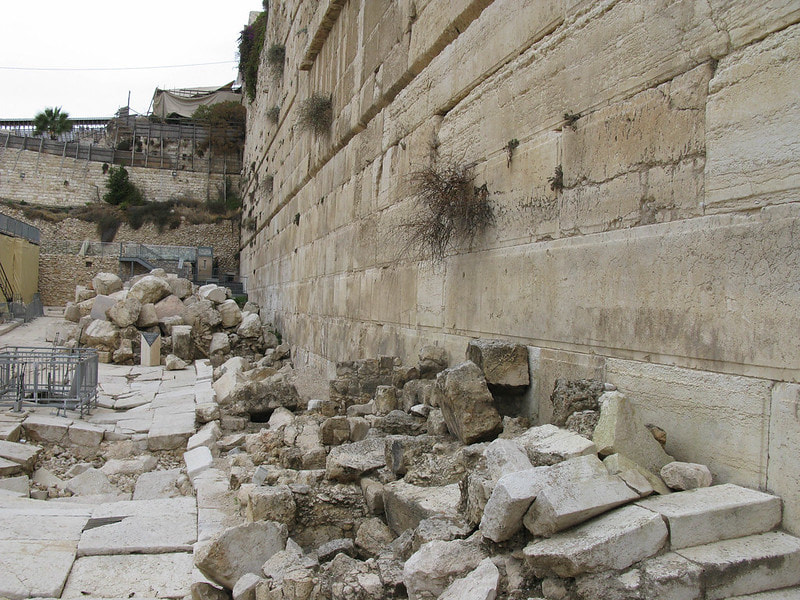|
Why would the sixth month on the Hebrew calendar be referred to as "a haven in time"? To answer this question, we must look back at the last two months, Tammuz and Av. The fourth month, Tammuz, is remembered as the time when the Israelites sinned by building the golden calf and worshiping it. Av, the fifth month, is known as the low point on the Hebrew calendar. It was during this month that the children of Israel decided to receive a negative report from the ten spies who searched out the Promised Land. Their sin of unbelief and negative confession put them under a curse. This has allowed Israel's enemies to destroy what they are attempting to build.
Now comes the sixth month—Elul. God is so in love with His children that it is painful for Him to be separated from them. Hence, Elul has been designated as the month of repentance, mercy, and forgiveness. Our Heavenly Father gives us an opportunity to repent for past sins so that He can extend mercy and forgiveness. And, He has decided to do this in a very personal way! He wants us to prepare ourselves for a face-to-face meeting with Him. The Jewish people say that this is the month that "The King is in the field." Most of the year the King lives in a palace, separated from his people. But during this one month the King left His palace to be with His people. He selected this time to set up His tent in the field of His people so that He could make Himself accessible to us. His heart is set on tabernacling with us, and, as a sign of this passion for intimacy, the Hebrew letter for the sixth month is Vav, which pictures a tent peg or nail. Let us take God's eagerness for connection with us a little further. His yearning for intimacy is the reason He sent Jesus to earth. "In the beginning was the Word, and the Word was with God, and the Word was God...The Word became flesh and made His dwelling among us." (John 1:1 and 14) The word dwelling is the word for tent or tabernacle. Jesus left His throne to live in our fields. For 33 years the King lived in the fields on the earth. He lived in a tent of mortal flesh during that time so that we could relate to Him more closely. He came to extend mercy and forgiveness and to show everyone what love looks like. Jesus did that by dying on the Cross, by allowing the nails to attach Him to that Cross and making a way for us to spend eternity with Him. That way is through repentance of our sins and acceptance of His offering to be Lord over our lives. We become His dwelling place forever as we receive Him into our hearts. The King's delight to walk in the fields with us is so strong and beautifully expressed in several passages in the book Song of Solomon. He calls to us as expressed in Song of Solomon 2:14. "...Show me your face, let me hear your voice." Song of Solomon 6:3 is actually a Hebrew acronym for "Elul." "I am my beloved’s, and my beloved is mine..." It is time for us to pursue the King as He comes to walk in our fields. We must open our ears to hear what He has to share about our fields as He guides us with wisdom and kindness. He wants to provide for every one of our needs. As it says in Matthew 6:33, "But seek first His Kingdom and His righteousness, and all these things will be given to you as well." The Lord is here to remind us of His love and desire for us. We must respond with open arms that welcome Him. This is truly "a haven in time." rWithout the proper amount of water, a newly planted tree will not be rooted in its new location. The amount of water needed is determined by the caliper of the tree trunk. For example, a one-inch caliper tree needs about one to one and one-half gallons of water each time it is irrigated, whereas a four-inch caliper tree needs about four to six gallons. It is the roots of a tree that need the water so that they can grow to provide the nutrients for supporting the branches and leaves of the tree. Water needs to be applied directly to the root ball and to the backfilled soil so that the roots expand beyond the ball. The root establishment time for a tree increases with its caliper size. It takes about one and one-half years for a one-inch caliper tree to establish its root system; a four-inch caliper tree takes about six years.
Two effective methods are recommended for watering transplanted trees. In the first, a reservoir is created to hold the water. This can be done by making a circular mound of earth three to four inches high around the plant's root ball. The reservoir should be filled with a slow trickle of water that will infiltrate the root ball. Another option is to place a plastic bag called a "Treegator" at the base of the trunk. The bag is filled with water and will slowly release the water into the root ball through small holes in the bottom of the bag. This means that any turf or grass must be removed from the area so that the tree does not have to compete with the surrounding groundcover for moisture. When two to three inches of mulch is applied on top of the root ball it decreases water evaporation, helps control weed growth, insulates the soil, and improves soil health. Insufficient water harms all plants, and the effects of it can be seen at the top of the plant. The northeastern United States has been struggling with a drought this summer. Grass is brown, the leaves of corn plants are rolled up, tree leaves are turning brown and falling, and new bud growth is diminished or not occurring. All these signs show us that the plant roots are not receiving sufficient water. What are the spiritual applications of this principle? In the Bible rains represent blessing while droughts represent cursing. Deuteronomy 28 talks about the ramifications of following or not following God's commandments. For those who follow His commandments God says, "The Lord will open the heavens, the storehouse of His bounty, to send rain on your land in season and bless all the work of your hands..." (Deuteronomy 28:12) For disobedience God says, "The Lord will strike you with wasting disease, with fever and inflammation, with scorching heat and drought, with blight and mildew.” (Deuteronomy 28:22) God desires that we be well rooted and established in His love. (Ephesians 3:17) When this happens, Ephesians tells us, we will have power to grasp how wide and long and high and deep His love is, and "to know this love that surpasses knowledge—that you may be filled to the measure of all the fullness of God.” (Verses 18-19) This requires us to be filled with a reservoir of His spiritual rains in our hearts. In Jeremiah 31:12, the Lord tells His people that they will be "like a well-watered garden..." I think the best promise of all, however, comes from Jesus as He met the Samaritan woman at the town well: "Whoever drinks the water I give them will never thirst. Indeed, the water I give them will become in them like a spring of water welling up to eternal life." (John 4:14) When we root ourselves in God's garden and follow His ways, we can be assured that "we will be like a well-watered garden, like a spring whose water never fails." (Isaiah 58:11) We will be like the trees of the Lord talked about in Psalm 104:16. "The trees of the Lord are well watered." And well-watered trees bare good fruit. As a part of Israel's remembrance of the 9th of Av, the Israel Antiquities Authority made public their findings of a research project that investigated the destruction of the second temple in 70 AD. They report that one of the primary weapons used to destroy the temple was an instrument called a ballista. This is an ancient missile launcher with wooden frames and a central band of twisted ropes made into a sling. On 8/8/22 All Israel News reported the discovery of a stockpile of chiseled stones, what the Romans called "ballista stones." Jewish historian, Josephus, wrote about them being used to penetrate the northwest side of the wall in Jerusalem.
I find it fascinating that it was catapulted stones that destroyed the Temple. It also interesting that the prescribed way to punish many crimes in Israel during Biblical days was through execution by stoning. Here are the crimes that required stoning, as taken from the Old Testament: Idolatry (Leviticus 20:2-5), Sorcery (Leviticus 20:27), Blasphemy (Leviticus 24:14-16), Picking up sticks on the Sabbath (Numbers 15:31-36), Inciting others to apostasy (Deuteronomy 13:6-10), Worship of false gods (Deuteronomy 17:2-7), Rebellion against parents (Deuteronomy 21:18-21), Sexual immorality by an unwed woman (Deuteronomy 22:20-21), Sexual relations with a betrothed woman (Deuteronomy 22:23-24). This method of execution required community participation and became a strong deterrent for the listed crimes. Stones can be reminders of death and destruction as we see above, but also of the faithfulness of God. He opened a path through the Jordan River so that the Israelites could cross over into the Promised Land. "When the whole nation had finished crossing the Jordan, the Lord said to Joshua, 'Choose 12 men from among the people, one from each tribe, and tell them to take up 12 stones from the middle of the Jordan, from right where the priests are standing; and carry them over with you and put them down at the place where you stay tonight...These stones are to be a memorial to the people of Israel forever.'" (Joshua 4:1-3, 7) These stones would be called "stones of remembrance." When David was going to battle against the giant Philistine his weapon of choice was a sling shot and five smooth stones. 1 Samuel 17:50 tells us that "David triumphed over the Philistine with a sling and a stone..." and the Philistine army ran in fear. For me, the most encouraging Scripture in the Bible about stones comes from 1 Peter 2:4-10. Jesus Christ is described as a living cornerstone of God's temple. Though He was rejected by many people, He is God's chosen Son. Those who follow Christ are called "living stones that God is building into His spiritual temple." Here is the assurance that we receive from God. "I am placing a cornerstone in Jerusalem, chosen for great honor, and anyone who trusts in Him will never be disgraced." We are reminded that "The stone that the builder's rejected has now become the cornerstone." (V. 7 - NLT) We, being living stones, have spirits that cannot be destroyed by stones. The promise of God is that we will spend eternity with Him when we embrace the Cornerstone of His Temple, the Lord Jesus Christ. As part of an inner healing team at my church, I see many ways in which the devil and his demons try to trick people into coming into agreement with the kingdom of darkness. I am reminded of a line in Martin Luther's hymn, "A Mighty Fortress." The first verse declares that God is our mighty fortress who helps us against the enemy. However, our enemy never stops trying to trick us. "For still our ancient foe doth seek to work us woe—His craft and power are great, and, armed with cruel hate, on earth is not his equal."
One of the devil's primary weapons is that he plants seeds of doubt in our minds. We can go all the way back to the Garden of Eden to see the first time he used this trick to destroy the lives of Adam and Eve. The Bible describes his aptitude for deception: "Now the snake (serpent) was the most cunning of all living beings that Yahweh-God had made. He deviously asked the woman, 'Did God really tell you, 'You must not eat fruit from any tree in the garden?'' But the woman interrupted: 'We may eat the fruit of any tree in the garden, except the tree in the center of the garden. God told us, 'Don't eat its fruit, or even touch it, or you'll die.'' But the snake said to hear, 'You certainly won't die.'" (Genesis 3:1-4 - TPT) We all know the result of Eve's doubt—She ate the forbidden fruit along with her husband. Why? It was because of doubt and unbelief. Scriptures are filled with stories of individuals who discounted God's promises and doubted the veracity of His word. The Israelites made the month of Av, our current month, the lowest point on the Hebrew calendar through their unbelief. God's intent was that this would be the month to celebrate His goodness. The Israelites stood at the border of the Promised Land, the place where God wanted them to live and demonstrated to the rest of the world His loving kindness and faithfulness. Spies sent into Canaan brought back the amazing fruit of the land. Grapes were so huge that they were carried back to the tribes on a pole between two men. Yet, there were two voices amongst the twelve men who spied out the land. Caleb and Joshua declared the voice of faith while the other ten men declared a voice of unbelief. God's promise to the tribes of Israel was undeniable. "The Lord will fight for you; you need only be still." (Exodus 14:14) The Israelites had a choice to make. Would they partner with God or with doubt and unbelief? The fear they took on made them embrace unbelief. On the 9th of Av, they made a wrong decision and a negative confession that placed them under a curse. As they partnered with doubt and unbelief, the promises of God were delayed. The manifestation of the curse went on year after year and continues today. The cycle of destruction can be seen in the events that have occurred on the 9th of Av. Here is a short list: Babylon destroyed the first temple, Rome destroyed the second temple, Hitler began deporting Jews to death camps, Jews were expelled from England, Spain, Portugal, and Gaza, all in different years. You may ask why this cycle of destruction has continued. Hebrews 4:1-3 explains what happened. "Now God has offered to us the same promises of entering into His realm of resting in confident faith. So, we must be extremely careful to ensure that we all embrace the fullness of that promise and not fail to experience it. For we have heard the good news of deliverance just as they did, yet they didn't join their faith with the Word. Instead, what they heard didn't affect them deeply, for they doubted. For those of us who believe, faith activates the promise, and we experience the realm of confident rest..."(TPT) The children of Israel never repented for their sin of unbelief which allows the enemy to continue on his path of destruction. The sin was repeated when Jesus, the Messiah, came to earth. He told the Jews He is the Son of God, demonstrated His Kingdom through miracles, and gave them words of life. The promises Jesus brought were not received, and they embraced unbelief. We must be the generation that redeems the sin of unbelief. It might seem like an impossible task, but the Lord has shown us how to do it. The steps follow: Confess the sin of believing a lie; Forgive those who contributed to the way we formed the ungodly belief; Ask for and receive God's forgiveness; Renounce and break any agreement with the powers of darkness; Choose to accept, believe, and receive God's truth. Verse 3 of "A Mighty Fortress" says it all: "And tho this world, with devils filled, should threaten to undo us. We will not fear, for God hath willed, His truth to triumph thru us. The prince of darkness grim—we tremble not for him; His rage we can endure; for lo his doom is sure—One little word shall fell him." Let's choose to believe God's promises and enter His blessing! |
Joan E. MathiasCategories
All
Archives
July 2024
|




 RSS Feed
RSS Feed